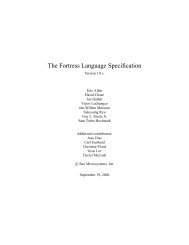- Page 1 and 2:
Smalltalk Best Practice PatternsVol
- Page 3 and 4:
STATE..............................
- Page 5 and 6:
PrefaceThis preface will explain wh
- Page 7:
AcknowledgmentsI would like to than
- Page 10 and 11:
Many of the patterns tell you what
- Page 12 and 13:
day to day in development and docum
- Page 14 and 15:
What’s Missing?There are a few co
- Page 16 and 17:
AdoptionHow can you learn and use t
- Page 18 and 19:
Why Patterns WorkHere is the Big As
- Page 20 and 21:
Role of PatternsReadingThese patter
- Page 22 and 23:
BehaviorObjects model the world thr
- Page 24 and 25:
Composed MethodYou are implementing
- Page 26 and 27:
Complete Creation MethodA Composed
- Page 28 and 29:
ConversionHow do you convert inform
- Page 30 and 31:
Converter Creation MethodYou need t
- Page 32 and 33:
Query MethodA Composed Method has h
- Page 34 and 35:
Execute Around MethodHow do you rep
- Page 36 and 37:
MessagesMessages are the heartbeat
- Page 38 and 39:
Choosing MessageYou are using a Mes
- Page 40 and 41:
Decomposing MessageYou are using a
- Page 42 and 43:
Intention Revealing SelectorYou may
- Page 44 and 45:
Integer>>addFloat: aFloat^self asFl
- Page 46 and 47:
Class: SuperFindingClientsuperclass
- Page 48 and 49:
Extending SuperYou are using Super.
- Page 50 and 51:
DelegationA Composed Method needs w
- Page 52 and 53:
Self DelegationYou are using Delega
- Page 54 and 55:
Pluggable BehaviorHow can you param
- Page 56 and 57:
Pluggable BlockYou need complex Plu
- Page 58 and 59:
marriedMenAndUnmarriedWomen^self ma
- Page 60 and 61:
Instance VariablesI wrote the secti
- Page 62 and 63:
Variable StateHow do you represent
- Page 64 and 65:
Timer>>defaultMillisecondPeriod^100
- Page 66 and 67: Default Value MethodYou have a comp
- Page 68 and 69: Direct Variable AccessYou need to a
- Page 70 and 71: Getting MethodYou are using Lazy In
- Page 72 and 73: Collection Accessor MethodYou are u
- Page 74 and 75: Enumeration MethodYou are using Ind
- Page 76 and 77: Role Suggesting Instance Variable N
- Page 78 and 79: Temporary VariableA Composed Method
- Page 80 and 81: Caching Temporary VariableA Perform
- Page 82 and 83: Reusing Temporary VariableTemporary
- Page 84 and 85: CollectionsThe collection hierarchy
- Page 86 and 87: CollectionHow do you represent a on
- Page 88 and 89: RunArrayYou are using an OrderedCol
- Page 90 and 91: | s |s := Set new.Like an OrderedCo
- Page 92 and 93: You may need Double Dispatch for co
- Page 94 and 95: DictionaryYou need a Collection tha
- Page 96 and 97: SortedCollectionYou have a Collecti
- Page 98 and 99: ByteArrayYou need to represent an A
- Page 100 and 101: (1 to: anArray size) collect:[:each
- Page 102 and 103: IsEmptyHow do you test if a collect
- Page 104 and 105: ConcatentationHow do you put two co
- Page 106 and 107: DoHow do you execute code for each
- Page 108 and 109: Select/RejectHow do you execute cod
- Page 110 and 111: Inject:into:You need an Enumeration
- Page 112 and 113: Duplicate Removing SetYou have a Co
- Page 114 and 115: StackHow do you implement a stack?O
- Page 118 and 119: Lookup CacheHow do you optimize com
- Page 120 and 121: Parsing StreamHow do you write a si
- Page 122 and 123: ClassesThere is probably no coding
- Page 124 and 125: Qualified Subclass NameYou have cre
- Page 126 and 127: FormattingNo other topic generates
- Page 128 and 129: Type Suggesting Parameter NameYou a
- Page 130 and 131: Rectangular BlockYou are writing an
- Page 132 and 133: Conditional ExpressionHow do you fo
- Page 134 and 135: Simple Enumeration ParameterWhat sh
- Page 136 and 137: self listPane parentcolor: Color bl
- Page 138 and 139: Point>>printOn: aStreamaStreamprint
- Page 140 and 141: Development ExampleIn this chapter,
- Page 142 and 143: Money>>setAmount: aNumber currency:
- Page 144 and 145: MoneySum>>printOn: aStreammonies do
- Page 146: | m1 m2 |m1 := Moneyamount: 5curren
















